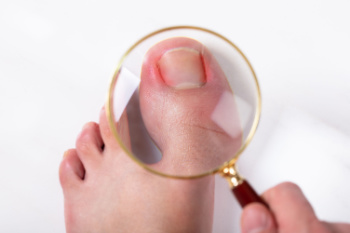
An ingrown toenail is more than a nuisance. It can quickly become a painful and persistent problem. When the nail’s edge presses into the skin, irritation follows. If ignored, this small issue can develop into an infection that impacts your ability to walk comfortably. Many factors contribute to ingrown toenails, including trimming nails too short, wearing shoes that squeeze the toes, and sustaining toe injuries. Some individuals are simply more prone to this condition due to the natural shape of their nails. Prevention often begins with simple habits, such as cutting toenails straight across and avoiding overly tight footwear. However, once an ingrown nail becomes inflamed or infected, professional care is the best option. If you are experiencing persistent toe pain or signs of infection, it is recommended that you see a podiatrist for a thorough evaluation and appropriate treatment.
Ingrown toenails can become painful if they are not treated properly. For more information about ingrown toenails, contact Donovan Gowdie, DPM of The Foot & Ankle Treatment Center. Our doctor can provide the care you need to keep you pain-free and on your feet.
Ingrown Toenails
Ingrown toenails occur when a toenail grows sideways into the bed of the nail, causing pain, swelling, and possibly infection.
Causes
- Bacterial infections
- Improper nail cutting such as cutting it too short or not straight across
- Trauma to the toe, such as stubbing, which causes the nail to grow back irregularly
- Ill-fitting shoes that bunch the toes too close together
- Genetic predisposition
Prevention
Because ingrown toenails are not something found outside of shoe-wearing cultures, going barefoot as often as possible will decrease the likeliness of developing ingrown toenails. Wearing proper fitting shoes and using proper cutting techniques will also help decrease your risk of developing ingrown toenails.
Treatment
Ingrown toenails are a very treatable foot condition. In minor cases, soaking the affected area in salt or antibacterial soaps will not only help with the ingrown nail itself, but also help prevent any infections from occurring. In more severe cases, surgery is an option. In either case, speaking to your podiatrist about this condition will help you get a better understanding of specific treatment options that are right for you.
If you have any questions please feel free to contact our office located in Watkinsville, GA . We offer the newest diagnostic and treatment technologies for all your foot and ankle needs.
